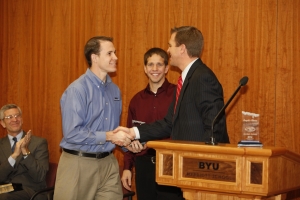Sales Management Students Trained to Sell with Integrity
Ross Johnson and Jordan Jones accept awards from
marketing professor Sterling Bone for their
sales management class’s Sale Idol competition. PROVO, Utah – Jan 15, 2010 – Everyone knows the stereotype — the pushy, obnoxious and at times deceptive salesperson. But a new curriculum taught in a Brigham Young University sales management class shows students sales and integrity aren't mutually exclusive and that salespeople can be just as good at listening as they are at making the pitch.
"Selling with integrity can be challenging because it means you have to focus on more than simply closing the sale," says Ross Johnson, a marketing major from Chino Hills, Calif. "This class has taught me how to do that. I've learned how to identify a buyer's needs and how to show a buyer that my product or service can meet those needs. In the end, I can feel good about making a sale, but I can also feel good about truly helping a client."
Sterling Bone, a marketing professor who teaches the sales management class, says that too few sales classes emphasize the importance of integrity in selling. Bone believes the word "integrity" has a dual meaning; it implies morality as well as completeness, both of which are encompassed by this new curriculum. The key, he notes, is listening.
"Many sales practices are what we call stimulus-response techniques, where you follow a certain script, show certain pictures or give certain demonstrations to get a response," Bone says. "An often overlooked but essential part of sales is listening, analyzing and understanding the needs of the customer."
The sales management curriculum is based on a training program developed by Utah-based company Griffin Hill, called the Integrity Sales System, which provides students with a playbook for the sales process, outlining the essential steps to a successful sale, from "case open" to "fulfillment and follow-up."
Johnson says one of the most useful aspects of the class was the Sales Idol competition, an in-class activity which gives students the opportunity to put their selling skills to the test. Rounds were sponsored by various companies, including Kraft Foods, Breg Medical, Ecolab and At Task. For each round, a company sent a representative to role play with students. In the Breg Medical round, for example, students were asked to sell a knee brace to the potential "buyer," who came outfitted in scrubs.
"What's fun about the Sales Idol competition is that it teaches students to adapt to different personality styles," says Bone. "The students have to use verbal and nonverbal cues to identify the buyer's style — be it analytical, amiable, expressive or driver — and then adjust accordingly."
Bone reports that some of his students have already received job offers from companies that were familiar with Griffin Hill's Integrity Sales System and were impressed with the students' selling skills.
Scott Baird, founder and president of Griffin Hill, says he is pleased with the relationship he has established with the Marriott School, and even assisted with some of the classroom instruction.
"Our clients get a significant increase in sales," he says, "and when students master powerful selling skills, they can really make a difference in the workplace and will be very desirable to employers."
The Marriott School is located at Brigham Young University, the largest privately owned, church-sponsored university in the United States. The school has nationally recognized programs in accounting, business management, public management, information systems, entrepreneurship, and recreation management and youth leadership. The school's mission is to prepare men and women of faith, character and professional ability for positions of leadership throughout the world. Approximately 3,300 students are enrolled in the Marriott School's graduate and undergraduate programs.
Media Contact: Joseph Ogden (801) 422-8938
Writer: Holly V.W. Munson




